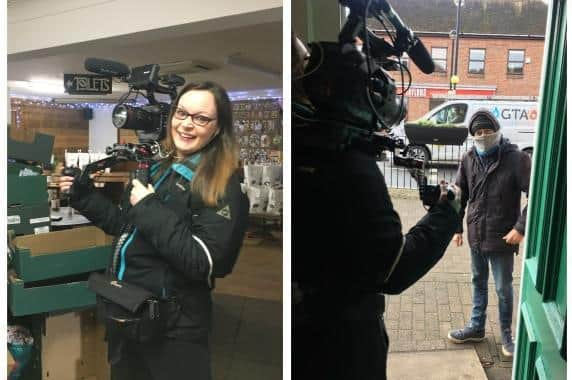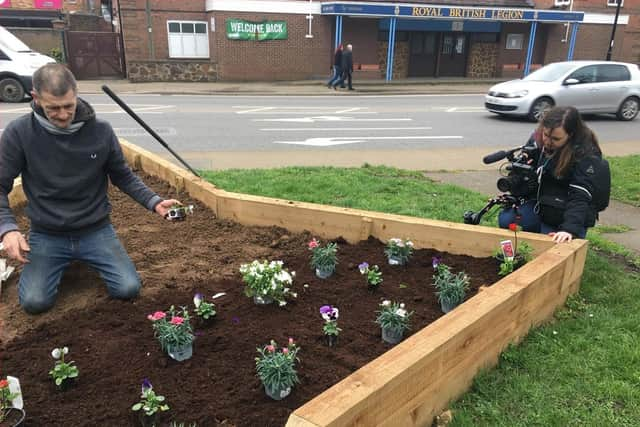Leighton Buzzard film maker releases touching documentary about Black Horse Homeless Shelter
This article contains affiliate links. We may earn a small commission on items purchased through this article, but that does not affect our editorial judgement.
and live on Freeview channel 276
A Leighton Buzzard filmmaker has created a moving documentary about The Black Horse during its final days as a homeless shelter.
Felicity Cross, 31, interviewed staff and residents in March to capture life at the charity in the midst of the pandemic, as big decisions were made about its future.
Advertisement
Hide AdAdvertisement
Hide AdThe final result is a touching film about Leighton Linslade Homeless Service (LLHS) and how it supported guests during the lockdowns, focussing on two men, Paul and Charlie, as they turned their lives around.


Felicity told the LBO: "During the third lockdown, there wasn't much work around. I had a few offers but they weren't right, and I wanted to move my career from producing roles to directing, with something that was self shot.
"I live really, really close to The Black Horse and walk past it when I'm commuting to London. I knew I wanted to do something locally, for a charity, and the building is really unique and they are right in the heart of the town.
"I researched LLHS and found a really long 30-page PDF report about what they had done during lockdown and how well the guests had done - one guy had taken up flower arranging to keep themselves busy.
Advertisement
Hide AdAdvertisement
Hide Ad"I thought that there was a lot in terms of a story, and everyone is really pleased with the film and said that it had all been worth it."


What Felicity didn't know when she first met manager Paul Latimer to discuss the film is that the LLHS was in the process of winding down its guest house. This was because many homeless people had been provided with accommodation as a result of increased funding from central government, therefore running the shelter was no longer cost effective.
Felicity added: "I wanted to showcase the great work they had done during the pandemic, and they didn't have anything to lose. If anything, I thought it could be a record to of their time."
As it was a solo project, Felicity was able to borrow a camera from a friend and receive assistance with editing, spending a few weekends getting to grips with the software.
Advertisement
Hide AdAdvertisement
Hide AdShe interviewed guests Paul and Charlie, as well as manager Paul Latimer and volunteer and education co-ordinator, Rosie George, thinking carefully about how to link each shot together and tell a story.
Paul and Charlie were both very open with Rosie, with Charlie explaining that he'd lived in a tent under a bridge in town, while Paul had been a highflying businessman who had fallen on hard times.
Remembering her trip to the bridge with Charlie, Felicity said: "I felt that it was an important part that I wanted to capture for people, so they could understand what it was like living on the streets.
"It's quite hard to comprehend, as we take so much for granted. The best way was to bring Charlie back to the bridge, to see how he felt, how he slept; he gets down and says 'this is my table [a large rock], he says it in a light way as it had such a big impact on him."
Advertisement
Hide AdAdvertisement
Hide AdSpeaking about former guest Paul, who now has his own place, she added: "It was lovely to see. He kept saying how grateful he was and that the LLHS had saved his life."
Felicity first showed the finished film to Paul and Charlie, Rosie George and Paul Latimer, who were really pleased with what she had achieved.
There was then a special screening at The Black Horse to celebrate the documentary.
Felicity concluded: "It's [the film] is about being grateful for what you have in life and not taking things for granted.
Advertisement
Hide AdAdvertisement
Hide Ad"It's cathartic because it's closing down, but if I thought it I don't film this now I wouldn't capture it. It was a chance to show what they had done and to capture a part of history before it was gone."
Aside from her local project, Felicity specialises in sensitive access documentaries for prime time.
Her work includes producing Channel 4’s Losing It: Our Mental Health Emergency, feature-length The Abused for Channel 5 (both BAFTA nominated) and has shot for broadcast on Channel 4’s Call the Cops, as well as 'Secret World of...' which aired recently on Channel 4 about some of Britain's favourite snacks.
She has also worked on some of UK television’s biggest series, including All or Nothing: Tottenham Hotspur for Amazon Prime, 24 Hours in A&E, 24 Hours in Police Custody, Educating Greater Manchester (all for Channel 4), BBC3's Glow Up: Britain's Next Make-Up Star and BBC2’s Hospital. Felicity was chosen as one of Edinburgh TV Festival’s 'Ones to Watch' for 2020, designed to showcase some of the industry’s rising stars.
To watch her film about the The Black Horse homeless shelter, visit: https://vimeo.com/594804836